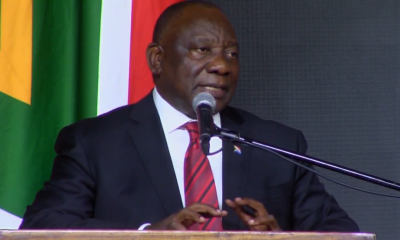411
Moeletsi Mbeki: Cut State Salary Bill by 50% to Save South Africa’s Economy

Political economist Moeletsi Mbeki has called for urgent reforms to South Africa’s public sector spending, saying the country must cut its government salary bill by 50% to reverse economic decline.
Mbeki, who chairs the South African Institute of International Affairs, warned that the civil service wage bill is unsustainable and one of the highest in the world relative to GDP.
“South Africa’s wage bill towers over global standards. It’s not sustainable and is crowding out productive investments,” Mbeki said in an interview with BusinessTech.
A Wage Bill That’s Breaking the Budget
Studies by the International Monetary Fund (IMF) and the World Bank found that South Africa’s public sector wage bill consumes 12% to 13% of GDP — significantly above the global average of around 6% for developing economies.
A separate Centre for Risk Analysis report found that South Africa has the third-highest wage bill as a percentage of GDP among 20 major economies. The country even surpasses developed nations like the United States, United Kingdom, and Japan.
“South Africa’s wage bill, at about 10.5% of GDP, is far above that of peer countries like Chile and Thailand,” the report noted.
Debt, Taxes, and No Room for Growth
The growing salary burden has also contributed to soaring public debt. In 2008/09, South Africa’s debt stood at R627 billion (26% of GDP). Today, it has ballooned to R5.21 trillion — nearly 74% of GDP.
In the 2025 National Budget, Finance Minister Enoch Godongwana revealed that R823 billion would go toward employee compensation, while R433 billion would be spent on debt interest payments, and R285 billion on social grants.
Together, these three items account for 59% of total government spending, leaving little room for infrastructure, education, or business investment.
“The government is taxing the private sector to fund excessive state salaries, which is stifling economic reinvestment,” Mbeki said.
Reversing the Decline in Growth
Mbeki pointed out that under former President Thabo Mbeki, South Africa’s economy grew at an average of 4.2%, thanks to disciplined fiscal policy and targeted public investment.
By contrast, economic growth has slowed to 1.7% under Jacob Zuma and dropped even further to 0.6% under Cyril Ramaphosa’s leadership.
“We’ve moved away from a growth path to one of stagnation, driven largely by unproductive spending,” Mbeki warned.
The Solution: Halve the Salary Bill and Invest in Growth
To put South Africa back on a growth trajectory, Mbeki says the civil service salary bill must be slashed to between 6% and 7% of GDP — essentially cutting it in half.
Doing so, he argues, would free up hundreds of billions of rands for infrastructure, education, industrial development, and entrepreneurship, helping the economy recover and creating sustainable jobs.
South Africa faces a stark choice: continue funding an oversized civil service at the expense of growth, or restructure spending to support economic development.
According to Moeletsi Mbeki and global financial institutions, cutting the public wage bill is not just an option — it’s a necessity.
{Source: BusinessTech}
Follow Joburg ETC on Facebook, Twitter , TikTok and Instagram
For more News in Johannesburg, visit joburgetc.com



























